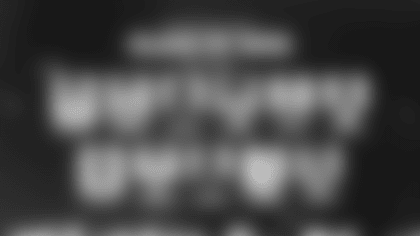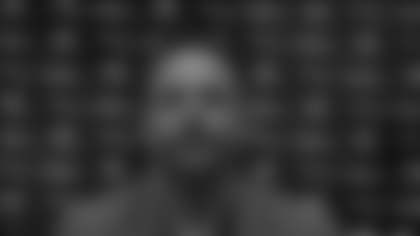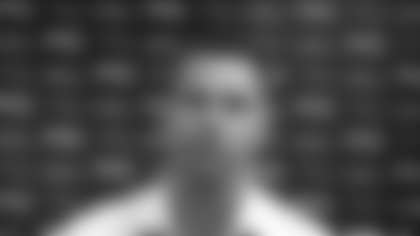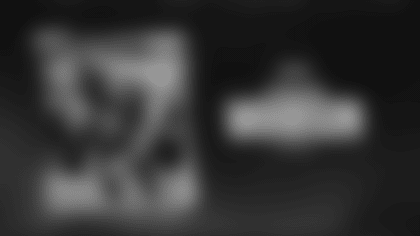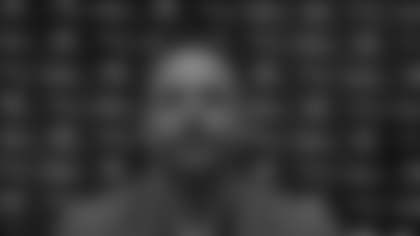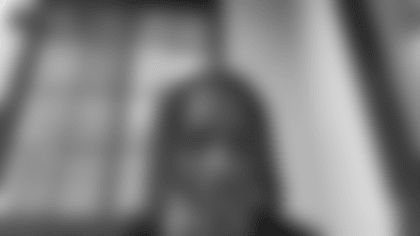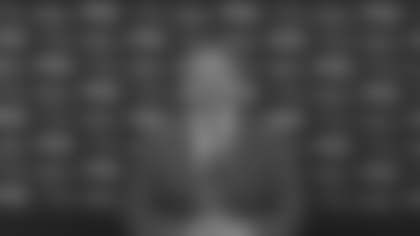PATRIOTS VICE PRESIDENT OF PLAYER PERSONNEL RYAN COWDEN
PRESS CONFERENCE
April 26, 2025
Q: Hey Ryan, thanks for doing this this afternoon.
RC: Hey Chris [Price], how are you doing? You're welcome.
Q: Good, good. First off, I don't think we've had a chance to talk to you since you took the job. How do you feel like you've done when it comes to settling into the position? Secondly, if you could follow up with some thoughts on how things have fallen together for you guys so far?
RC: Sure. Settling is probably an aggressive term. I don't know that's happened yet, but it's been great. It's been a real exciting venture for me. I'm familiar with a lot of people in the building already over my years in the business. I had some connections with the coaching staff that came in. A lot of great guys there and I've known Eliot [Wolf] for a long time. I've been able to come in, find a way that I can add any value to the organization, be a resource, continue to learn myself, and also try to help us get back to where this organization needs to get.
Q: If you could do a run down some of the standouts, the highlights for you over the first couple days here?
RC: This is a long process. The draft starts probably 18 months prior to that draft actually occurring. For our scouts, that's when it happens, too. I think one of the highlights is seeing all the work that goes in behind the scenes, the time away from home by the scouts, the amount of reports, the investigations into the person, the calls, all that stuff. It's a huge amount of work that largely goes unseen and unnoticed, but it's paramount into us making these decisions. The highlight for me is when the guys that you select and you feel like fit some of the fabric of the organization, when you're able to acquire those players, that's the exciting part, the culmination of that whole process. Now, here they are. It's a chance to come help your team.
Q: Hey Ryan, good to talk to you. I'm wondering if there's one common theme that you guys are looking for in this draft with the players you're bringing in right now? What is that theme?
RC: It's this idea, Ian [Steele], that from free agency and now through the draft, they're not always going to be perfect and fit exactly to the criteria. The most that we can sit there and talk about that we're adding, guys who love playing football, guys who are great teammates. We all want talented players, we do. There's an idea here that can't be overstated enough is that if you don't get the person right, then a lot of that other stuff can go by the wayside. I think we've been trying to be very intentional about the people, about some of the people to build the foundation that Coach Vrabel and his vision has here for this football team. That started in free agency and that's been a major emphasis for us as we've gotten into this draft process.
Q: Hey Ryan, it's good to speak with you. Thank you for taking the time. First of all, did Mike [Vrabel] put you up to this? Stacey [James]? How do we get the benefit of talking to Ryan Cowden this afternoon?
RC: What happened was, I think somebody made a major error, and my name wasn't supposed to be in the rotation, and somehow it got slid in there. At that point, it was too late so they didn't have a choice. I think somebody made an error totally on that.
Q: All right, we got lucky. I'm curious if you can just give us the cliff notes of the guys you took today, obviously starting with Craig [Woodson] and then all the way up to Andres [Borregales] here. Specifically with Andres being a warm weather kicker coming to New England?
RC: Yeah, sure. Craig's a player that we had some great exposure with at the East-West game. Craig was able to come in here. He's a great person, a high level of character, a really smart football player. I think the communication skills that he possesses at the safety position are something that sets him apart. Cal's had a history of having really good communicators in their program from the backfield for the defensive secondary standpoint. That's a little bit about Craig, just a great person and a high level communicator at the safety position. Josh [Farmer] has an amazing story. Josh has faced a ton of adversity in his life. Josh is eager and looking forward to continue to be coached, continue to develop some of the traits and skills that he possesses. Josh has had a relationship with our defensive line coach, Coach [Clint] McMillan. They've had a relationship for a long time and it helped us understand the picture of Josh too in a lot of ways. Again, going about investing in people, you guys have probably heard Coach Vrabel talk about that. Investing in the people, it's what we want to do once they become a part of our team. When we took [Bradyn] Swinson, he really had an interesting career at LSU. He started in the back end of things behind some good players, but he always had a knack to rush the passer. I think over the last two years, he's had more opportunities to do that. His ability on the edge to create pressures, have some disruption out there from a hard program at LSU. With the kicker, we thought that [Andres] Borregales has a big leg, he's really talented. I know the idea about kickers a lot of times is strong legs, and that's obviously paramount. I think the weather is one of those things where we all talk about it, but is there really a metric or a measurement that says, 'What is the production in cold weather games?' If I'm not mistaken, I think Nick Folk kicked at Arizona and did okay for a long time here to some degree. I think what you want to focus on is, 'What's the mindset and the makeup of the person?' 'What's the talent level?' 'How explosive is the ball coming off his foot?' Just like anything, I don't think we can base that this guy had this exposure. Your poll would really shrink if you said, 'Let me go find cold weather kickers and who are they?'
Q: Hey, Ryan, a little bit more on Craig. For what it's worth, out of all your picks, the consensus out there is that he was the biggest reach. Obviously you guys had last night, you had this morning, it would seem that he's a guy that you targeted. What did you see about him? Does he have nickel versatility? Do you have a specific spot in mind for him?
RC: Sure. I think last night I spoke to some people. I don't want to pigeonhole Craig or any of our players into one spot. I think Craig's a safety. I think he has the versatility to play a lot of roles that the safety position requires. As I mentioned before, the communication skills is something that sets him apart. Craig's a skilled, high-level communicator. We have a process here that we believe in, in terms of our evaluations, our process of scouting. We're always going to try to stay true to that. I think I had, being there on the heels in Tennessee, and I'm not going to make this comparison to a player. Talking about trusting your evaluations, Kevin Byard was a non-Combine guy out of Middle Tennessee that had high level communication with a smart guy in the third round. It was, 'Tennessee reached.' I'm not ever going to compare players, but comparing situations, it's a situation where a team trusted the board. I've had those scenarios in Carolina, Tennessee, New York, and that's what you want to believe in. Regardless of what the perception on the outside is, what matters is what we would think inside that room.
Q: Hey, Ryan, hope you're doing well. You guys have been moving up and down the board a little bit today. Just wanted to know what the thought process was on some of those moves, trading out a pick, adding a pick back in there?
RC: Right. I think that's the fun part about the draft. Sometimes opportunities don't present themselves. There's always got to be two partners, right? There's got to be somebody willing to come up and somebody willing to go down. What you try to do is just as best you can. Can you get to a line of players that match the value on your board? When we say that, sometimes it does say, 'I don't feel great about this line of players at this pick. Can we get down to where we feel like the value matches as closely as possible to what we see or how we evaluated a player?' A lot of the times that becomes the reasons why you want to maybe move up and down. That's another reason why having draft capital is important. It is currency within the draft to be able to move and either acquire players or acquire more picks to give you more swings at the plate. That movement, a lot of times is reflective of trying to match where you've placed value on these players on your board.
Q: Hey Ryan, thanks for doing this. I'd say from free agency to the draft, it really seems like you guys have increased the talent level on the roster and certainly the depth looks a lot better. How happy are you with where this roster is at? What's the optimism level? How optimistic are you guys that the ship is sort of turning here?
RC: Well, we hope that the talent levels increase. Otherwise, I think Mr. Kraft might say, 'What have you guys been doing for the last few months?' That's our job, right? That's what we're tasked to do. I think you never settle. You can constantly chase. When we're done tonight, and after we sign the post-draft players, the first thing we're going to look at is tomorrow and Monday, maybe wait until Monday, we're going to look at it and say, 'Where are we not good enough? Where did we not fill? Where do we not have enough depth?' It's an ongoing, constant, hard look and focus on your roster. Where do we have to get better at? I know that probably sounds cliche, but it is a real thing. As soon as you think you're good enough in one position, you should probably take a look at it again, because you're probably not. To the second part of your question, we're excited. We really are. I think from everything we've tried to do from some of the personality and the energy into the building, trying to get to know each other as new staffs coming together, empowering the people that were here, to lean into them for their decisions. I can't thank the scouting staff enough, the college guys, the pro guys, the scouting assistants, the ops, the analytics group, our IT help. It has been a lot that we've asked them to do that's different over these last couple of months. Excited about how that path is going. Hopefully, we can continue to add more and more to that.
Q: Hi, Ryan. We appreciate you taking the time. I'm piggybacking off of Mark [Daniels], who sort of asked my question, but I'll ask it in a different way.
RC: Should have let you go first then.
Q: You've obviously mapped out a plan from the time you guys got here and formulated a plan through free agency in the draft. I'm wondering how well you think that plan has been executed? Are you where you want to be right now heading into the seventh round?
RC: Sure. Plans are something we all have, right? In different walks of life, there's always plans. I think one of the biggest things you have to be able to do is deviate from the plan when it doesn't go accordingly. Reacting, moving in new spaces, and being able to be fluid with everything we do, it's paramount, because whether it's free agency and you feel as you're as aggressive as possible in anything you can do, it's a player's choice where they want to go. A lot of times you may hear from the outside, 'I can't believe they didn't get this guy,' or, 'Can't believe they didn't get that,' when you've done everything in your power to make that happen. The player has the choice. The free agent part of that isn't free for the club. It's the freedom of choice by the player. We try to then to shift, move and constantly readjust those plans based on what happens and who we can acquire. Going into the draft, we have a plan, but again, you're at the mercy of the picks. We move around in the draft and try to get a line of players we choose, but you don't know where it's going to fall. You don't know who might go in front of you. You may think you've got it lined up and a guy goes just before you, and now you've got to be able to really react. So, the old, 'Knees bent, head on a swivel.' That is a real part. I think we've tried to stick to some parameters of the plan, going back to before about the people. If we aren't able to acquire a person that maybe we really wanted to, let's focus on making sure we're still getting the right people as we adjust.
Q: Hey Ryan, hopefully can end on a good one here. One of the interesting parts about talking to you today, and also what's happening with the Patriots is you have the new people coming in, Coach Vrabel, yourself, Stretch [John Streicher], melding with the people that were here. Eliot [Wolf] Matt [Groh], Alonzo [Highsmith], Cam [Williams]. Last night, Eliot told a story at the start of the second round, how you guys were talking about a couple of players, and there was a healthy dialogue, I believe was the way he described it. Ultimately, he said you didn't have to decide between two players because one of them got picked before the player you picked at 38. My question is what do you remember about that? Is that a significant thing from your view in terms of how you guys came together? How do you view the melding of the two groups coming together?
RC: Sure. We've had these long relationships, but they're on the surface and things change when you're actually working. Day in, day out, the hours that this job requires, that changes than just knowing somebody on the fringes and on the surface, seeing them at the Combine and all-star games, right? That's been unique. That's been something that I think we've both been intentional about trying to make sure that we go and take the steps necessary so that we can start to understand each other. You end up where you're so busy, sometimes you can skip over things. I think through the process about, 'Let's make sure we both see this. Let's make sure we talk about that.' I think the point he's making before the pick was really about one of those moments where there was a time element involved, right? The clock's ticking. There's some discussions. There's a couple of players that involve opinions from both sides. I want to lean into the opinions of the staff, whether that's Eliot, myself, Cam, Zo, one of the college guys, Matt Groh. Whatever that is, those opinions matter. I'm never going to have all the right answers. I can promise you. I think collectively, when we put those thoughts and opinions together and are able to voice those and respect each other for where those opinions come from, I think that can get you to the right answer. I think what happened last night was just an illustration of that in real time. It was really good. I think it's a healthy thing. I think in the end, what that does is it allows us to come to a consensus after listening to each other's opinions and understanding that you respect where those come from because of the work that's been put in by each of those individuals.



